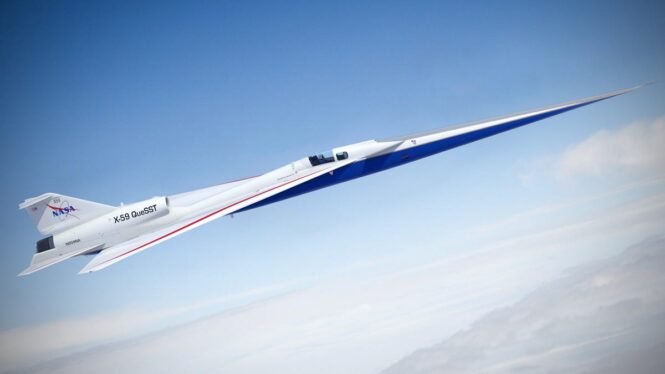3 min read
NASA Targets 2024 for First Flight of X-59 Experimental Aircraft

NASA’s Quesst mission has adjusted the scheduled first flight of its X-59 quiet supersonic aircraft to 2024.
A one-of-a-kind experimental aircraft, the X-59 has required complex engineering from NASA researchers working with prime contractor Lockheed Martin Skunk Works. In addition to the aircraft’s design, the X-59 also combines new technology with systems and components from multiple, established aircraft, such as its landing gear from an F-16 and its life-support system adapted from an F-15.
As part of the demands of developing this unique aircraft, the Quesst team is working through several technical challenges identified over the course of 2023, when the X-59 had been scheduled to make its first flight. Extra time is needed to fully integrate systems into the aircraft and ensure they work together as expected. The team is also resolving intermittent issues with some of the safety-redundant computers that control the aircraft’s systems.
Quesst made steady progress toward flight over the past year. The team installed the finishing touches to the X-59’s tail structure, which allowed them to finalize its electrical wiring and proceed to critical ground tests, and moved it from its assembly facility to the flight line to perform structural testing.
The X-59 will demonstrate the ability to fly supersonic, or faster than the speed of sound, while reducing the normally loud sonic boom to a quiet sonic thump. NASA plans to fly the X-59 over several communities to gather data on how people perceive the sound it produces. The agency will provide that information to U.S. and international regulators to potentially adjust rules that currently prohibit commercial supersonic flight over land.
NASA’s top priorities for any mission are safety and ensuring success. For Quesst, that means not only being sure that the X-59 is safe before it flies, but safe in the long term and reliable during the community test phase. The aircraft is currently undergoing integrated testing, which must be completed before it flies. Once that stage is complete, the aircraft will continue its journey with a flight readiness review, at which point NASA plans to release a more specific timeline for first flight.
Quesst is a mission with the potential to revolutionize commercial aviation travel by dramatically reducing travel time. Safely and reliably flying the X-59 is critical for NASA to achieve those benefits. The agency is committed to a thorough review and testing process that results in the success of that mission.
Share
Details
Related Terms
https://www.nasa.gov/aeronautics/nasa-targets-2024-for-first-flight-of-x-59-experimental-aircraft/










